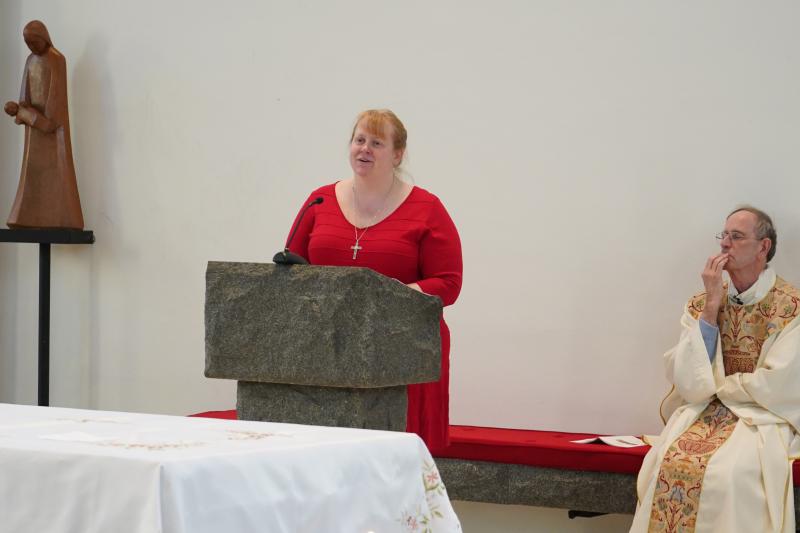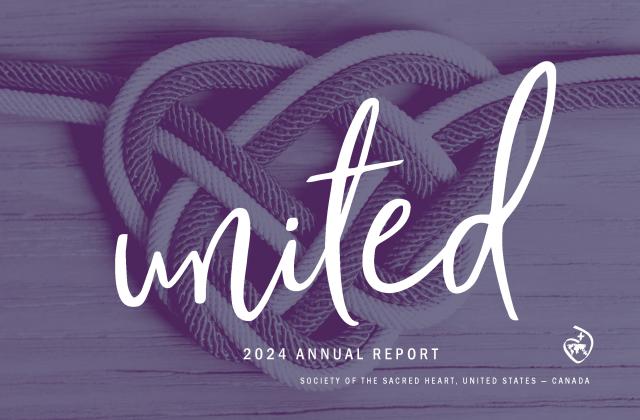
The province welcomed and celebrated newly professed Juliet Mousseau, RSCJ, on Saturday, February 22, 2020, in St. Charles, Missouri.
The following is Sister Mousseau's reflection from her celebration Mass.
First Reading: Jeremiah 8, 7-8
Second Reading: Romans 8, 28-39
Gospel Reading: John 4: 5-30, 39-42
This reading which tells of Jesus’s encounter with the Samaritan woman at the well is a conversion story. It also has all the elements of a good vocation story.
First, there’s the unexpected encounter with Jesus, when the woman clearly went to the well hoping not to see anyone. That is like the unsolicited realization that you might be called to religious life or the priesthood. It just slips into your mind, and it can’t be removed.
Next is the denial. Me? You can’t mean me. Jews don’t associate with Samaritans. You must be looking for someone else. Religious life certainly wasn’t part of my five-year plan. Plus, if you knew me, really knew me, you’d know that I’m not cut out for that.
Though Jesus and the Woman have just met, we get to peek at a moment of intimate conversation. You can hear them teasing one another: what are you doing asking me? Aren’t people like you supposed to shun people like me? And, how do you think you can offer me water, without a bucket?
And then there’s the growing realization that it is you, yes, you, Jesus is in fact talking to you. Despite all your protests, he knows you at the depth of your being, and calls you as you are. He knows she’s had five husbands and is living with yet another man. He knows she’s embarrassed by her life. And yet he asks for her to serve him, to give him water.
When he speaks to her, he reminds her of who she is. He’s not judging her, just letting her know what he sees, and drawing her reality into the conversation. He names the thing she finds shameful, recognizing her truth in love, without adding to her shame.
Jesus and the woman at the well share an experience of intimacy and communion that helps us see the importance of honest encounters and relationships. Through this brief encounter, we get a glimpse into the way Jesus relates with those he meets. He knows her. He accepts her. He reaffirms the truth of her history. And he loves her. His love for her is the offer of himself, of the Living Water. This whole hearted interaction with another is what every human being craves. It is through our honest and intimate encounters with God in prayer and other people in the world that we come to know who we are and figure out who we are called to be.
Next in our story of conversion/vocation, we hear the promise Jesus offers, Living Water, that he is the source of all Life and Love. This is the promise that following your call is what will bring you joy, whether or not that call is to religious life. Above all else, Jesus wants you to have his Living Water. He wants to show you that his love is unconditional. It doesn’t matter whether you’re from Samaria or Montana, whether your life goes against or with Church teaching.
Finally, there’s the impulse to go to the whole world and tell what you have received. The Samaritan woman knows Jesus is the Messiah because he knows who she is and loves her. Jesus knows who I am and loves me, he knows who you are and loves you. No matter what. Like the Samaritan woman, we are called to share the good news with others, and the power of that call overcomes our fears of not being accepted or believed.
This is the transformation of Love. Loved, we know courage and purpose.
This transformation sends the Samaritan woman to tell her neighbors of the Good News she found at the well. She no longer tries to avoid them. In speaking her truth, Jesus allows her to embrace all that she is and go declare it to the world without shame.
Each one of us has had experiences of transformative love like that of the Samaritan woman. Love transforms – that’s part of its very nature. Love allows us to enter into the life of another and bring that life out of darkness to be seen and accepted.
Loving relationships are somewhat unpredictable, as are human beings. Love that transforms is always trying to know the other, more and more intimately, while also knowing that a human person is ultimately mystery. Love for another promotes her health and wholeness, and her unique gifts and talents. It means letting go of my ideas or plans for her life, and letting her become who God created her to be, which I may never understand. It requires us to grow in mutual trust. Perhaps most importantly, to love someone means I must show her how I see God’s presence in her life and being.
While the Samaritan woman was changed by a single conversation, that is rarely how our lives are transformed. Loving relationships are a long slow process of self-revelation and growing trust. In relationship with God and with others, we must open ourselves to the transforming power of love.
A call to religious life is such a relationship, with God, with my sisters, and with my own self-understanding. Over these many years of formation, I have tried to trust God’s slow work in me, showing me the beauty of a life given in love to the one from whom all Love comes.
While the gospel story ends with the woman preaching to the townspeople, our story of vocation continues. No matter who we are called to be and what we are called to do, Jesus has promised to nourish us with his living water. And so we plant ourselves in faith on the bank of the river. From this rootedness, we draw the love we need to live our lives as gift to God and others. We simply need fidelity – to stay with the living water. There by the bank of the river, we are nourished and assured that all is well, for God is Good. We know that nothing can separate us from the Love of God. As we return again and again to the well, to the river, the fullness of Love that we receive compels us to share it with others.
What more could we ask for?



